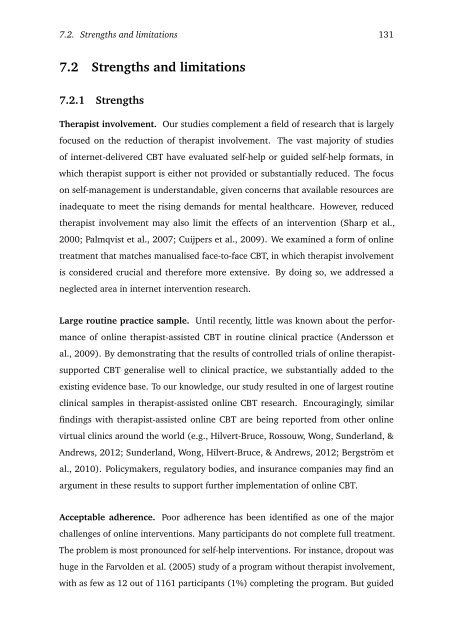The Efficacy and Effectiveness of Online CBT - Jeroen Ruwaard
The Efficacy and Effectiveness of Online CBT - Jeroen Ruwaard
The Efficacy and Effectiveness of Online CBT - Jeroen Ruwaard
- No tags were found...
You also want an ePaper? Increase the reach of your titles
YUMPU automatically turns print PDFs into web optimized ePapers that Google loves.
7.2. Strengths <strong>and</strong> limitations 1317.2 Strengths <strong>and</strong> limitations7.2.1 Strengths<strong>The</strong>rapist involvement. Our studies complement a field <strong>of</strong> research that is largelyfocused on the reduction <strong>of</strong> therapist involvement. <strong>The</strong> vast majority <strong>of</strong> studies<strong>of</strong> internet-delivered <strong>CBT</strong> have evaluated self-help or guided self-help formats, inwhich therapist support is either not provided or substantially reduced. <strong>The</strong> focuson self-management is underst<strong>and</strong>able, given concerns that available resources areinadequate to meet the rising dem<strong>and</strong>s for mental healthcare. However, reducedtherapist involvement may also limit the effects <strong>of</strong> an intervention (Sharp et al.,2000; Palmqvist et al., 2007; Cuijpers et al., 2009). We examined a form <strong>of</strong> onlinetreatment that matches manualised face-to-face <strong>CBT</strong>, in which therapist involvementis considered crucial <strong>and</strong> therefore more extensive. By doing so, we addressed aneglected area in internet intervention research.Large routine practice sample. Until recently, little was known about the performance<strong>of</strong> online therapist-assisted <strong>CBT</strong> in routine clinical practice (Andersson etal., 2009). By demonstrating that the results <strong>of</strong> controlled trials <strong>of</strong> online therapistsupported<strong>CBT</strong> generalise well to clinical practice, we substantially added to theexisting evidence base. To our knowledge, our study resulted in one <strong>of</strong> largest routineclinical samples in therapist-assisted online <strong>CBT</strong> research. Encouragingly, similarfindings with therapist-assisted online <strong>CBT</strong> are being reported from other onlinevirtual clinics around the world (e.g., Hilvert-Bruce, Rossouw, Wong, Sunderl<strong>and</strong>, &Andrews, 2012; Sunderl<strong>and</strong>, Wong, Hilvert-Bruce, & Andrews, 2012; Bergström etal., 2010). Policymakers, regulatory bodies, <strong>and</strong> insurance companies may find anargument in these results to support further implementation <strong>of</strong> online <strong>CBT</strong>.Acceptable adherence. Poor adherence has been identified as one <strong>of</strong> the majorchallenges <strong>of</strong> online interventions. Many participants do not complete full treatment.<strong>The</strong> problem is most pronounced for self-help interventions. For instance, dropout washuge in the Farvolden et al. (2005) study <strong>of</strong> a program without therapist involvement,with as few as 12 out <strong>of</strong> 1161 participants (1%) completing the program. But guided


